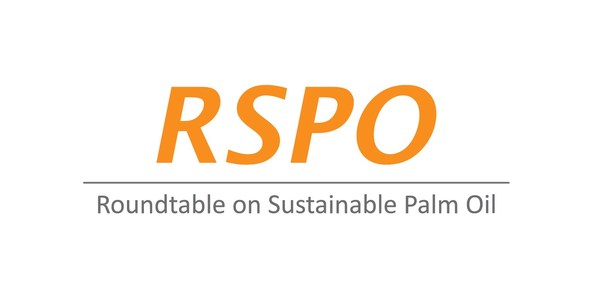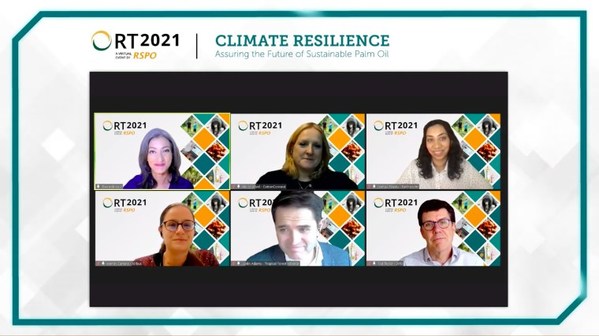 |
With renewed COP26 commitments, Airbus, CottonConnect, Earthworm Foundation, Tropical Forest Alliance and World Resources Institute called for collaborative action across supply chains during RSPO's 2021 roundtable conference to achieve positive impact for people and planet.
KUALA LUMPUR, Malaysia, Nov. 25, 2021 /PRNewswire/ -- On 16 November, the Roundtable on Sustainable Palm Oil (RSPO) hosted the 2021 Virtual Roundtable Conference on the theme of "Climate Resilience: Assuring the Future of Sustainable Palm Oil". The panel brought together leading voices across the agricultural commodities sector to exchange views on some of the thorniest issues in the industry - from climate change to accessible technological innovation to economic inclusion.

Panellists opened with their views on COP26, highlighting that forests and land use have never been more prominent during the summit where over 100 world leaders pledged to end and reverse deforestation by 2030. Directly impacting commodities like palm oil - often seen as a driver of deforestation and greenhouse gas emissions - COP26 underscored the vital need for solutions like RSPO and other voluntary initiatives.
Protecting human rights and labour rights
The first deep dive addressed the complex issue of human rights and labour rights, where panellists emphasised that human rights and labour rights' violations cannot be separated from environmental issues, and they remain some of the toughest challenges facing agri-commodity industries.
Panellists highlighted the importance of standards, such as RSPO's, "as guidance for a rights-based approach across supply chains," Janhavi Naidu from the Earthworm Foundation said. "We focus on translating the agenda, visions and expectations set by RSPO and similar standards into resources and actionable solutions. This is because actors require guidance, time and investment to be able to scale just labour practices."
Echoing this sentiment, Alison Ward from CottonConnect added, "Ensuring just treatment of workers requires strong investment in each step of the supply chain, local intervention and engagement. In the textile sector, this means brands and companies meeting farmers, ginners and spinners to understand their concerns and investing adequate resources to address them." She shared examples of building trust in cotton growing communities in India and Pakistan to ensure that their health and safety needs are met, inspired by similar work in the palm oil sector.
Appropriate uses of technology
Panellists also explored the importance of leveraging innovation and technologies to address climate challenges. Technology can help provide greater transparency and traceability in the palm oil supply chain and enable businesses to uphold their sustainability commitments. RSPO has been at the forefront of developing solutions to strengthen the credibility of its certification scheme.
Rod Taylor from the World Resources Institute (WRI) cited one example, GeoRSPO, which integrates RSPO concession maps with the Global Forest Watch platform. He explained "Global Forest Watch feeds directly into GeoRSPO by combining satellite imagery and cloud computing to show land use change in a user-friendly manner... it helps companies manage deforestation risk in their supply chain and integrate risk management and reporting into a single system".
Wendy Carrara from Airbus elaborated, "We have invested 20 years of research and development on a verification tool that promotes traceability to plantations, raises alerts on deforestation and correlates it with supply chain data. Altogether, this ensures the responsible sourcing of palm oil. Satellite images are analysed using biophysical parameters to create a base map against which monitoring can be done at scale and with local precision".
Supporting rural livelihoods
The final deep dive discussion covered how achieving climate resilience through certification like RSPO not only delivers benefits for the planet, but for people too. Achieving climate resilience in the sustainable palm oil sector is not merely an ecological imperative - it can also generate social empowerment by strengthening workforce capacity, creating jobs and fostering economic development.
Justin Adams from the Tropical Forest Alliance advocated for integrating livelihoods into climate action: "There is a clear recognition of the importance of the social dimension in achieving environmental goals; climate goals are central but just one dimension to optimise. We need ecopreneurs in the landscape to drive real change". Rod continued by highlighting that the big picture solution is to optimise existing resources like land through sustainable practices, stabilise existing resources, and make farming more lucrative, topped with incentives to reward good stewardship.
Despite the challenges ahead, the past few years have seen closer integration of environmental and social goals - key to securing a sustainable and resilient future across the palm oil sector. Panellists closed on an optimistic note by saying that organisations like RSPO are critical because they bring communities together to solve problems. "It goes beyond simply increasing the volume of Certified Sustainable Palm Oil and towards creating a sustainable palm oil ecosystem; all of us have a role to play in achieving this", said Justin.
About RSPO:
The Roundtable on Sustainable Palm Oil (RSPO) was formed in 2004 with the objective of promoting the growth and use of sustainable oil palm products through credible global standards and engagement of stakeholders. RSPO is a not-for-profit, international, membership organisation that unites stakeholders from the different sectors of the palm oil industry including oil palm producers, palm oil processors or traders, consumer goods manufacturers, retailers, banks and investors, environmental or nature conservation NGOs, and social or developmental NGOs.
This multi-stakeholder representation is mirrored in the governance structure of RSPO such that seats in the Board of Governors, Steering Committees and Working Groups are fairly allocated to each sector. In this way, RSPO lives out the philosophy of the "roundtable" by giving equal rights to each stakeholder group, facilitating traditionally adversarial stakeholders in working together to reach decisions by consensus, and achieving RSPO's shared vision of making sustainable palm oil the norm.
The seat of the association is in Zurich, Switzerland, while the secretariat is currently based in Kuala Lumpur with satellite offices in Jakarta (ID), London (UK), Zoetermeer (NL), Beijing (CN) and Bogotá (CO).